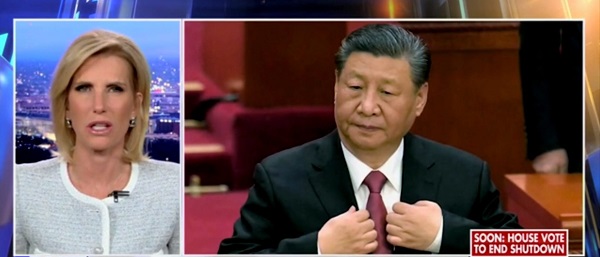Censorship Industrial Complex
Australian politicians attack Elon Musk for refusing to remove video of Orthodox bishop’s stabbing

Photo by Leon Neal/Getty Images
From LifeSiteNews
By David James
The video is available on YouTube but Australia’s political class is singling out and waging war on X owner Elon Musk for his refusal to delete footage of the stabbing of Orthodox Bishop Mar Mari Emmanuel.
In a demonstration of governmental overreach the Australian prime minister, Anthony Albanese, has attacked Elon Musk, the owner of X (formerly Twitter) for not acceding to demands to put a worldwide ban on video footage of an attempted stabbing of a bishop in a Sydney church.
Albanese is not alone; virtually the entire Australian political class has joined in the attack. Tanya Plibersek, minister for Environment and Water called Musk an “egotistical billionaire.” Greens senator Sarah Hanson-Young described him as a “narcissistic cowboy.” Albanese chimed in by describing him as an “arrogant billionaire who thinks he’s above the law.”
Senator Jacqui Lambie went as far as suggesting that Musk be “jailed” for his refusal to bend to the demands of the Australian government.
In response to Lambie’s comments, Musk declared her to be an “enemy of the people of Australia,” agreeing with another social media user who suggested it should be Lambie, not Musk, who belongs in jail.
This Australian Senator should be in jail for censoring free speech on X. https://t.co/vnYvBjpXav
— Rothmus 🏴 (@Rothmus) April 23, 2024
The right wing Liberal-National coalition was only slightly less aggressive saying Musk was offering an “insulting and offensive argument” in his refusal to remove graphic footage of the stabbing. How Musk saying that posts should not be taken down is “insulting and offensive” was not explained.
The victim of the attack, Bishop Mar Mari Emmanuel, an Iraqi-born Assyrian Australian prelate who is head of the Eastern Christ the Good Shepherd Church, has displayed a maturity and moral virtue conspicuously lacking in the political arena. Emmanuel recorded a message saying that he loved his assailant, and that he wanted the video to stay online, urging people not to respond to violence with violence.
After the incident there were riots outside the church, resulting in 51 officers sustaining injuries. A 16-year-old boy has been arrested and charged with a religiously motivated terrorist attack.
The court battle between the Australian government and Musk is being characterised as a contest between free speech and the government’s role in protecting people. Certainly for Musk it is very much about protecting free speech.
That formulation is inaccurate. There is no effective protection of free speech in Australia, unlike the US, which has the First Amendment of the Constitution. The Federal government is currently preparing a misinformation and disinformation bill to force social media companies only to allow content of which the government approves.
As Senator Ralph Babet of the United Australia Party observes it is a “censorship agenda” that will be pushed no matter which party is in power. “The office of the eSafety commissioner was created under the Liberal Party and is now being emboldened by the Labor Party,” he writes.
The public battle with Musk is better seen as an attempt by the Australian government to control what is on the internet. The newly appointed eSafety commissioner, Julie Inman-Grant directed X to remove the posts, but X had only blocked them from access in Australia pending a legal challenge. The government then demanded that the posts be removed world-wide.
That the Australian political class thinks it has the right to issue edicts in countries where it has no legal jurisdiction is a demonstration of the lack of clarity in their thinking, and the intensity of their obsession with censoring.
Musk accurately characterised the situation in a post: “Should the eSafety Commissar (an unelected official) in Australia have authority over all countries on Earth?” It seems that many Australian politicians think the answer to that question is “Yes.”
The childish personal attacks on Musk, typical ad hominem attacks (going at the person rather than the argument) are revealing. What does the fact that Musk is a billionaire have to do with the legal status of the posts? Does having a lot of money somehow disqualify him from having a position?
If he is “egotistical” or “arrogant” what does that have to do with his logical or legal claims? How does exposing Musk as a narcissistic cowboy” have any relevance to him allowing content on the platform? Wouldn’t a narcissist be more likely to restrict content? The suspicion is that the politicians are resorting to such abuse because they have no argument.
The Australian government’s attack on Musk, which borders on the absurd, is just one of many being directed at X. An especially dangerous initiative is coming from the European Union’s Digital Services Act, which can apply fines of up to 6 per cent of the worldwide annual turnover, a ridiculously punitive amount. The United Kingdom’s communications regulator, Ofcom is even worse. It will have powers to fine companies up to 10 per cent of their global turnover.
Western governments are mounting an all out push to censor the internet, and Australia’s aggressive move is just part of that. What is never considered by governments and bureaucrats is the cost of such censorship.
The benefits of “protecting” people are always overstated and inevitably infantilize the population. The price is a degradation of social institutions and a legal system that does not apply equally to the citizenry and to the government. It is a step towards tyranny: rule by law rather than rule of law.
Censorship Industrial Complex
EU’s “Democracy Shield” Centralizes Control Over Online Speech

Presented as a defense of democracy, the plan reads more like the architecture of a managed reality.
|
European authorities have finally unveiled the “European Democracy Shield,” we’ve been warning about for some time, a major initiative that consolidates and broadens existing programs of the European Commission to monitor and restrict digital information flows.
Though branded as a safeguard against “foreign information manipulation and interference (FIMI)” and “disinformation,” the initiative effectively gives EU institutions unprecedented authority over the online public sphere.
At its core, the framework fuses a variety of mechanisms into a single structure, from AI-driven content detection and regulation of social media influencers to a state-endorsed web of “fact-checkers.”
The presentation speaks of defending democracy, yet the design reveals a machinery oriented toward centralized control of speech, identity, and data.
One of the more alarming integrations links the EU’s Digital Identity program with content filtering and labelling systems.
The Commission has announced plans to “explore possible further measures with the Code’s signatories,” including “detection and labelling of AI-generated and manipulated content circulating on social media services” and “voluntary user-verification tools.”
Officials describe the EU Digital Identity (EUDI) Wallet as a means for “secure identification and authentication.”
In real terms, tying verified identity to online activity risks normalizing surveillance and making anonymity in expression a thing of the past.
The Democracy Shield also includes the creation of a “European Centre for Democratic Resilience,” led by Justice Commissioner Michael McGrath.
Framed as a voluntary coordination hub, its mission is “building capacities to withstand foreign information manipulation and interference (FIMI) and disinformation,” involving EU institutions, Member States, and “neighboring countries and like-minded partners.”
The Centre’s “Stakeholder Platform” is to unite “trusted stakeholders such as civil society organizations, researchers and academia, fact-checkers and media providers.”
In practice, this structure ties policymaking, activism, and media oversight into one cooperative network, eroding the boundaries between government power and public discourse.
Financial incentives reinforce the system. A “European Network of Fact-Checkers” will be funded through EU channels, positioned as independent yet operating within the same institutional framework that sets the rules.
The network will coordinate “fact-checking” in every EU language, maintain a central database of verdicts, and introduce “a protection scheme for fact-checkers in the EU against threats and harassment.”
Such an arrangement destroys the line between independent verification and state-aligned narrative enforcement.
The Commission will also fund a “common research support framework,” giving select researchers privileged access to non-public platform data via the
Digital Services Act (DSA) and Political Advertising Regulation.
Officially, this aims to aid academic research, but it could also allow state-linked analysts to map, classify, and suppress online viewpoints deemed undesirable.
Plans extend further into media law. The European Commission intends to revisit the Audiovisual Media Services Directive (AVMSD) to ensure “viewers – particularly younger ones – are adequately protected when they consume audiovisual content online.”
While framed around youth protection, such language opens the door to broad filtering and regulation of online media.
Another initiative seeks to enlist digital personalities through a “voluntary network of influencers to raise awareness about relevant EU rules, including the DSA.” Brussels will “consider the role of influencers” during its upcoming AVMSD review.
Though presented as transparent outreach, the move effectively turns social media figures into de facto promoters of official EU messaging, reshaping public conversation under the guise of awareness.
The Shield also introduces a “Digital Services Act incidents and crisis protocol” between the EU and signatories of the Code of Practice on Disinformation to “facilitate coordination among relevant authorities and ensure swift reactions to large-scale and potentially transnational information operations.”
This could enable coordinated suppression of narratives across borders. Large platforms exceeding 45 million EU users face compliance audits, with penalties reaching 6% of global revenue or even platform bans, making voluntary cooperation more symbolic than real.
A further layer comes with the forthcoming “Blueprint for countering FIMI and disinformation,” offering governments standardized guidance to “anticipate, detect and respond” to perceived information threats. Such protocols risk transforming free expression into a regulated domain managed under preemptive suspicion.
Existing structures are being fortified, too. The European Digital Media Observatory (EDMO), already central to “disinformation” monitoring, will receive expanded authority for election and crisis surveillance. This effectively deepens the fusion of state oversight and online communication control.
Funding through the “Media Resilience Programme” will channel EU resources to preferred outlets, while regulators examine ways to “strengthen the prominence of media services of general interest.”
This includes “impact investments in the news media sector” and efforts to build transnational platforms promoting mainstream narratives. Though described as supporting “independent and local journalism,” the model risks reinforcing state-aligned voices while sidelining dissenting ones.
Education and culture are not exempt. The Commission plans “Guidelines for teachers and educators on tackling disinformation and promoting digital literacy through education and training,” along with new “media literacy” programs and an “independent network for media literacy.”
While such initiatives appear benign, they often operate on the assumption that government-approved information is inherently trustworthy, conditioning future generations to equate official consensus with truth.
Viewed as a whole, the European Democracy Shield represents a major institutional step toward centralized narrative management in the European Union.
Under the language of “protection,” Brussels is constructing a comprehensive apparatus for monitoring and shaping the flow of information.
For a continent that once defined itself through open debate and free thought, this growing web of bureaucratic control signals a troubling shift.
Efforts framed as defense against disinformation now risk becoming tools for suppressing dissent, a paradox that may leave European democracy less free in the name of making it “safe.”
|
|
|
|
You read Reclaim The Net because you believe in something deeper than headlines; you believe in the enduring values of free speech, individual liberty, and the right to privacy.
Every issue we publish is part of a larger fight: preserving the principles that built this country and protecting them from erosion in the digital age.
With your help, we can do more than simply hold the line: we can push back. We can shine a light on censorship, expose growing surveillance overreach, and give a voice to those being silenced.
If you’ve found any value in our work, please consider becoming a supporter.
Your support helps us expand our reach, educate more people, and continue this work.
Please become a supporter today.
Thank you for your support.
|
Censorship Industrial Complex
School Cannot Force Students To Use Preferred Pronouns, US Federal Court Rules


From the Daily Caller News Foundation
“Our system forbids public schools from becoming ‘enclaves of totalitarianism.’”
A federal appeals court in Ohio ruled Thursday that students cannot be forced to use preferred pronouns in school.
Defending Education (DE) filed the suit against Olentangy Local School District (OLSD) in 2023, arguing the district’s anti-harassment policy that requires students to use the “preferred pronouns” of others violates students’ First Amendment rights by “compelling students to affirm beliefs about sex and gender that are contrary to their own deeply held beliefs.” Although a lower court attempted to shoot down the challenge, the appeals court ruled in a 10-7 decision that the school cannot “wield their authority to compel speech or demand silence from citizens who disagree with the regulators’ politically controversial preferred new form of grammar.”
Because the school considers transgender students to be a protected class, students who violated the anti-harassment policy by referring to such students by their biological sex risked punishments such as suspension and expulsion, according to DE.
Dear Readers:
As a nonprofit, we are dependent on the generosity of our readers.
Please consider making a small donation of any amount here.
Thank you!
“American history and tradition uphold the majority’s decision to strike down the school’s pronoun policy,” the court wrote in its opinion. “Over hundreds of years, grammar has developed in America without governmental interference. Consistent with our historical tradition and our cherished First Amendment, the pronoun debate must be won through individual persuasion, not government coercion. Our system forbids public schools from becoming ‘enclaves of totalitarianism.’”
OLSD did not respond to the Daily Caller News Foundation’s request for comment.
“We are deeply gratified by the Sixth Circuit’s intensive analysis not only of our case but the state of student First Amendment rights in the modern era,” Nicole Neily, founder and president of DE, said in a statement. “The court’s decision – and its many concurrences – articulate the importance of free speech, the limits and perils of public schools claiming to act in loco parentis, and the critical role of persuasion – rather than coercion – in America’s public square.”
“Despite its ham-fisted attempt to moot the case, Olentangy School District was sternly reminded by the 6th circuit en banc court that it cannot force students to express a viewpoint on gender identity with which they disagree, nor extend its reach beyond the schoolhouse threshold into matters better suited to an exercise of parental authority,” Sarah Parshall Perry, vice president and legal fellow at DE, said in a statement. “A resounding victory for student speech and parental rights was long overdue for families in the school district and we are thrilled the court’s ruling will benefit others seeking to vindicate their rights in the classroom and beyond.”
-

 MAiD2 days ago
MAiD2 days agoQuebec has the highest euthanasia rate in the world at 7.4% of total deaths
-

 Frontier Centre for Public Policy17 hours ago
Frontier Centre for Public Policy17 hours agoRichmond Mayor Warns Property Owners That The Cowichan Case Puts Their Titles At Risk
-

 Alberta1 day ago
Alberta1 day agoHow economic corridors could shape a stronger Canadian future
-

 Daily Caller1 day ago
Daily Caller1 day agoLaura Ingraham’s Viral Clash With Trump Prompts Her To Tell Real Reasons China Sends Students To US
-

 Daily Caller2 days ago
Daily Caller2 days agoProtesters Storm Elite Climate Summit In Chaotic Scene
-

 Alberta1 day ago
Alberta1 day agoWhen Teachers Say Your Child Has Nowhere Else to Go
-

 Automotive2 days ago
Automotive2 days agoThe high price of green virtue
-

 Business17 hours ago
Business17 hours agoSluggish homebuilding will have far-reaching effects on Canada’s economy





